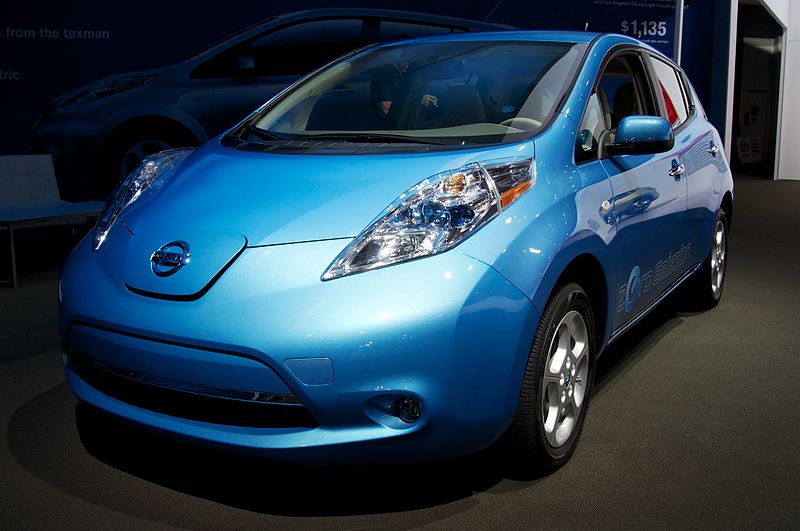
I keep telling my son that by the time he can drive, cars won’t be the destructive beasts farting all over our planet they are now, but will run on clean electricity, and you’ll be able to stand behind one breathing clean air.
The first part of the puzzle is being put in place with the arrival of the first fully electric car in South Africa later this year, the Nissan Leaf.
I hear lots of arguments against electric cars. “They’re more harmful to the environment because they displace the energy production from the car to the coal power station.” This argument is simply nonsense, because, even in South Africa, where, sadly, almost all the electricity produced is with coal, the energy efficiency gains in producing power centrally in a power station far outstrip those of the highly inefficient internal combustion engine. And of course, as the energy production swings to renewable, the gains are dramatic.
More convincing is “the pricing is a ripoff and you’ll never make back in fuel savings the extra you pay upfront.” This is true in many cases, particularly for the early hybrids. But when it comes to pure electric cars, how do things stack up?
Edmunds.com have done extensive calculations on payback periods in the US of various hybrid and electric cars against their conventional equivalents.
Remember that calculations like these are based on quite rigid assumptions. The exchange rate will fluctuate, petrol prices will change, electricity prices will change, car prices will change. So extrapolating them over a long period of time is interesting, but will come nowhere near predicting the actuality.
However, at present rates, the payback period for the electric Nissan Leaf against the equivalent conventional, Nissan Versa, priced at $10,000 less, is 9 years if petrol is $3 a gallon, and 5 years if petrol is $5 a gallon.
That’s based on the US rates for petrol (ranging from $3 to $5 a gallon in the comparisons) and electricity ($0.12 a kWh), and an average usage of 15,000 miles a year. The sales prices are unknown, as are any possible government incentives, but assuming the same hefty R100,000 price difference, how does this compare in South Africa?
Petrol here is more expensive than in the US, a $4.69 per gallon according to my calculations at current rates, and certain to increase quite substantially in July. Electricity prices vary according to the city and other factors, but are generally slightly cheaper here. That means that the payback period is already at the better end of the scale (5 years), and only likely to improve.
So an electric car, or the Nissan Leaf at least, seems to make both environmental and financial sense in South Africa.
The only argument against it is the limited range, quoted as “up to 200km” by Nissan. For the vast majority of most people’s trips, it’ll do just fine, but it will require a change in habits for longer trips, especially for the early adopters, when the fast-charge infrastructure won’t be widespread.
My son’s still got quite a few years to go before he needs to worry about driving, but I’m positive that by the time he starts thinking about it, the cars and cities of his time will be much cleaner than today’s.
And perhaps his first car will be a 10-year old Nissan Leaf.
(Image from Wikimedia Commons)
“Electricity prices vary according to the city and other factors, but are generally slightly cheaper here” – nope. We pay about R1.60 or something / kWh here, which, before the recent exchange rate slide, was on the expensive average side, even compared to the US. $0.12 is pretty optimistic, $0.18 is more like their average from what I can remember for them. SA is inching towards what Hawaii pays which is most expensive state.
The city of Cape Town rates are at http://www.capetown.gov.za/en/electricity/Pages/ElectricityTariffs.aspx
Commercial rates are mostly lower, domestic rates go as high as $0.159
The US rates are according to the study, which mentioned $0.18 as the extreme in rural Connecticut, but I can’t vouch for the figures. The 5-year breakeven was calculated at $0.12 electricity and $5 petrol, so as those fluctuate the period will change.
As the rand exchange rate drops here, petrol will follow more or less in sync, but electricity will drop in relative terms, making electric more attractive. If the exchange rate strengthens, the reverse applies.
Durban rates are at http://www.durban.gov.za/Resource_Centre/Services_Tariffs/Electricity%20Tariffs/2012%202013%20Tariff%20Book.pdf
R1.02 ($0.102) kWh ex VAT for residential, so pretty much matches the US’s $0.12 figure.